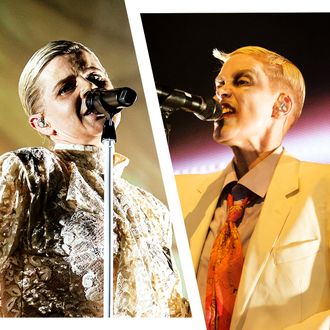
Back in January, more than 1,000 Swedish musicians signed an open letter asking for Israel to be excluded from Eurovision, which Sweden is hosting in May. The letter, published in the newspaper Aftonbladet, said Israel’s “brutal warfare in Gaza” should be disqualifying, per The Guardian’s translation. The artists argued that Israel’s participation would undermine the “credibility” of the European Broadcasting Union, which organizes the annual song contest. Musicians including Robyn, Fever Ray, First Aid Kit, the Knife’s Olof Dreijer, Refused, and Viagra Boys signed the letter, along with past Eurovision performers Eric Saade and Malena Ernman (mother of climate activist Greta Thunberg). “The fact that countries that place themselves above humanitarian law are welcomed to participate in international cultural events trivializes violations of international law and makes the suffering of the victims invisible,” it reads.
In response, the EBU said Israel’s public broadcaster, Kan, “met all the competition rules for this year.” “We understand the concerns and deeply held views around the current conflict in the Middle East,” the EBU told Vulture. “However, we are committed to ensuring the Eurovision Song Contest remains a nonpolitical event in which broadcasters and artists, not governments, compete.” Israel has participated in Eurovision for 50 years and won four times, most recently in 2018 with the song “Toy,” performed by Netta. Israeli singer Eden Golan will represent Israel this year. Her initial entry, “October Rain,” was reportedly deemed too political, which breaks EBU rules. Golan is instead now competing with the song “Hurricane.” Her inclusion has prompted calls for both viewers and contestants to boycott Eurovision 2024. She has also reportedly received death threats online. Here’s what to know.
How else has the EBU responded?
On April 9, the Eurovision organizers issued a statement acknowledging “the intense debate sparked by the inclusion of an Israeli entry” and condemning “any form of abuse or harassment” against any contestants. A lengthier statement posted on the EBU’s website acknowledged the “unquestionable pain suffered by those in Israel and in Gaza.” It added that EBU’s governing bodies — not individual artists — make decisions about Eurovision participation. “We firmly oppose any form of online abuse, hate speech, or harassment directed at our artists or any individuals associated with the contest,” the statement said. “This is unacceptable and totally unfair, given the artists have no role in this decision.”
EBU’s website also includes a FAQ page about Israeli participation this year, maintaining its stance that Eurovision is a nonpolitical event for which Israel and “Hurricane” meet the eligibility requirements.
Who is calling for a Eurovision boycott?
The Palestinian Campaign for the Academic & Cultural Boycott of Israel, which is part of the BDS movement, called for a boycott and asked all contestants to “be on the right side of history by immediately withdrawing from this year’s tarnished contest.”
PACBI’s sentiment is shared by Queers for Palestine, which has called for supporters to ask venues to cancel Eurovision screenings. In March, the group also wrote an open letter calling on Olly Alexander, who is representing the UK, to withdraw over Israel’s inclusion. Signees of the letter included Joel Kim Booster, Maxine Peake, and Sarah Schulman.
The Icelandic Association of Composers and Lyricists previously told members to boycott Eurovision if Israel was allowed to compete, per The Guardian, while a group of Finnish artists said the Finnish Broadcasting Company should not enter a song.
How have competing musicians responded?
On March 29, nine Eurovision participants — Ireland’s Bambie Thug, Demark’s Saba, UK’s Olly Alexander, Norway’s Gate, Portugal’s Iolanda, San Marino’s band Megara, Switzerland’s Nemo, Lithuanian singer Silvester Belt and Finland’s Windows95Man — issued a joint statement expressing “solidarity with the oppressed” and calling for “an immediate and lasting ceasefire, and the safe return of all hostages.” The artists explained that they will not be pulling out of the competition, writing, “We feel that it is our duty to create and uphold this space, with a strong hope that it will inspire greater compassion and empathy.”
In a separate individual statement, Alexander said he respects that some people will boycott Eurovision. At the same time, he affirmed his belief that leaving the contest “wouldn’t bring us any closer to our shared goal.”
Did Eurovision previously disqualify Russia?
Yes. In 2022, Russia was banned amid its invasion of Ukraine. The group had initially said Russia could compete before widespread criticism changed its mind. At the time, the EBU stated Russia’s participation “would bring the competition into disrepute.”
The EBU’s current FAQ page states that Russian broadcasters were suspended due to “consistent breaches of membership obligations and the violation of public service media values.” The page describes the relationship between Israeli broadcaster Kan and the Israeli government as “fundamentally different to the relationship that exists between those Russian Members and the State,” noting that the Israeli government had “in recent years threaten[ed]” to close Kan down.
This post has been updated.


